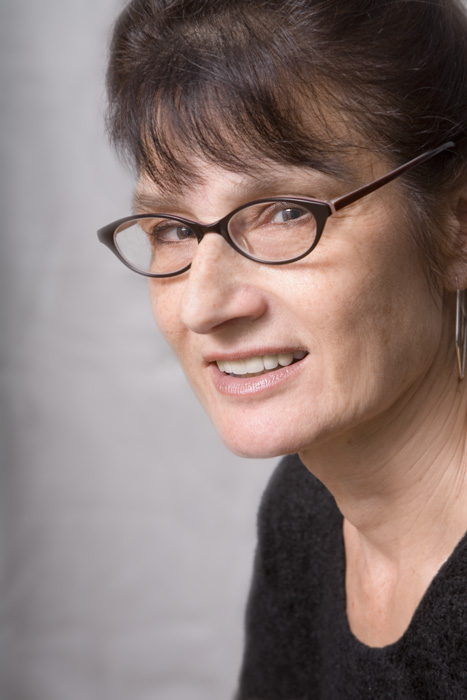McEachern sits with Joan Silber, SLC professor and Pen/Faulkner Award nominee
photo by Barry Goldstein
Joan Silber’s latest fictional endeavor, Fools, is a collection of intertwined short stories about, as she explains, “having ideas and living for these ideas, or not.” In six short stories, Silber follows characters for their entire lives, whether ideas make them enlightened or – as her work is titled – fools.
“The last three books I’ve done are all linked stories,” says Silber, who has published six other works of fiction, and one book on craft. “I feel like I’ve done my best work in that form. It has pushed me. It allows me to comment on a thematic center that can be viewed from all sides.”
Fools, which was long listed for the National Book Award, is currently a finalist for the Pen/Faulkner award. The Pen/Faulkner award is voted on by a jury of writers, and it is stressed that the award is given to the first among equals. Silber, who graduated from Sarah Lawrence in 1967, has also won the Pen/Hemingway award for her first novel, Household Words, in 1981. Silber’s last short story collection, Ideas of Heaven, was also a finalist for the National Book Award.
The idea to compress a character’s whole life into a single short story was inspired by acclaimed short story writer Alice Munro, who was awarded the Nobel Prize in literature in 2013 for her life’s work. The first short story in Fools, from which the collection takes its title, revolves around Vera, one of a group of anarchists in 1920s New York City. The rest of the stories offer protagonists who are somehow traced back to this group, including Vera’s daughter, Louise; the son, Anthony, of two of Vera’s radical compatriots; Anthony’s French ex-girlfriend, Liliane; even the son of an employee who is nearly fired because of money Anthony steals, which is later stolen from him by Liliane. “While many of the stories center around love, and love helps drive the plot,” says Silber, “the connecting link is ideas.” Silber’s favorites in the collection are the last short story, which features Liliane, and the shortest story in the collection called ‘Better.’”
Silber has taught at Sarah Lawrence since 1985, and she has also taught at NYU, and Boston University, where one of her fiction classes contained Jhumpa Lahiri, Ha Jin, and Peter Ho Davies. Silber teaches both graduate and undergraduate writing at SLC, and it was through her SLC email she found out she was a finalist for the Pen/Faulkner award.
“I came on a Tuesday and the notice had been there since Monday. I was looking for meetings, and here is this email from the Pen/Faulkner, so I ran across the hall and told Myra [Goldberg] right away. The official press release was Wednesday, and you are not supposed to tell anyone until that is out. Brian Morton told everyone in the writing faculty when I came in on Wednesday,” Silber says, adding, “It’s a very communal writing program.”
photo by Shari Diamond
What time of day do you write best?
“I write between lunch and dinner.”
What book do you think everyone should read in college?
“I am most qualified to speak about fiction, and I think Anton Chekhov’s short stories. Not only for fiction, but he teaches a type of humanity. Part of what Chekhov does – that I have hoped to copy – is he often has a character you would not dream of sympathizing with and you don’t like him or her for various reasons, but you have different feelings by the end of the story.”
How is Sarah Lawrence different from when you were a student here?
“There wasn’t a gym, but there was a gym credit that could be fulfilled by walking, which worked on an honor system. I knew lots of girls who fulfilled it by ‘aerobic shopping’ at Cross Country. I took ice skating, which was at a rink in Yonkers, where I drank a lot of hot chocolate. When I was a student, the library was in the basement of MacCracken. The dining hall is in the same place in Bates, but it has been remodeled. Sometimes I think the food has not changed. We did have something we called mystery meat, which was gray, with gravy.”
Where did you live as a student?
“I lived in Gilbert, the new dorms, and I lived in Westlands. There were cigarette machines and candy machines in every dorm building too.”
Has the academic structure changed very much?
“I would say the education has not changed that much. They had just instituted lectures to deal with the amount of students when I came here. Now there are more semester- long courses, and I like it that students can take more classes during their time here.”
Was there a particular class you took that changed everything for you?
Grace Paley [the poet, short story writer, and activist who taught at SLC between 1966 – 1989] was my writing teacher here. I was a poetry student and she had all the poets try writing a piece of fiction and that was a really big influence. Sarah Lawrence definitely encourages students to take different types of writing classes and to take different teachers. SLC professors expect them to be told different things by different professors. We’re not in conflict with each other, because we all think it’s a skill, not a body of knowledge.”
by Sarah McEachern '17
smceachern@gm.slc.edu


